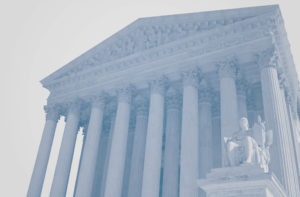So We Lost – What Now?

The Supreme Court has historically protected church-state separation and civil rights, however, recent appointments influenced by white Christian nationalists and their lobbying groups have dramatically changed the makeup of the court. This change is clearly demonstrated by the Bladensburg cross Supreme Court decision (American Legion et al. v. American Humanist Assn. et al), which drastically weakened the constitutional tests used by the majority to interpret the Establishment Clause. While the atheist and humanist community must continue to press for our rights in the judicial system, we need to take advantage of our growth in the population and greatly expand our efforts in the political and electoral arena.
Consider some of the best evidence of the Supreme Court’s history of defending church-state separation and civil rights: Brown v. Board of Education (1953) overturned “separate but equal” in racial segregation of public schools; Engel v. Vitale (1963) prohibited government-led prayer in public schools; Griswold v. Connecticut (1965) decriminalized the use of contraceptives; Roe v. Wade (1973) protected abortion rights; Edwards v. Aguillard (1987) prohibited the teaching of creationism as science in public schools; Lawrence v. Texas (2003) invalidated sodomy laws; Obergefell v. Hodges (2015) established marriage equality nationwide; and Fisher v. University of Texas (2016) upheld affirmative action in academic admissions.
While we don’t yet know which precedents will be overturned or how far the court might go in rolling back these hard-fought gains, the atheist and humanist community must organize and use our increasing numbers to become a recognized and influential force in American politics.
Justice Brett Kavanaugh, in his Bladensburg cross concurrence, even encourages us to do this. With regard to religious monuments, symbols, and practices in public spaces, Kavanaugh wrote,
The conclusion that the cross does not violate the Establishment Clause does not necessarily mean that those who object to it have no other recourse. The Court’s ruling allows the State to maintain the cross on public land. The Court’s ruling does not require the State to maintain the cross on public land… alternative avenues [legislative and executive] of relief illustrate a fundamental feature of our constitutional structure: This Court is not the only guardian of individual rights in America.
Although mute on the difficulty of minorities gaining their rights through these majoritarian institutions, let’s make Kavanaugh regret this recommendation by making the nontheist community a powerful political force in the United States.
The religiously unaffiliated, or what the Pew Research Center and others more commonly refer to as the “nones,” is a rapidly growing demographic, which bodes well for our efforts to be recognized in American politics. Pew’s research has shown that the “nones” have grown from 16 percent of the US population in 2007 to 23 percent in 2014. With a third of millennials falling into the “nones” category, the religiously unaffiliated community will only grow, becoming a larger proportion of the American population.
The percentage of religiously unaffiliated voters has grown from 12 percent in 2014, to 15 percent in 2016 and to 17 percent in 2018. We must continue this growth by encouraging more members of the atheist and humanist community to register and vote. However, showing up at the polls is just part of the change we can effect.
As individuals we need to be visible, out atheists and humanists, and active in campaigns and political party organizations, up to and including running for office. Nonprofit atheist and humanist groups need to be as engaged as the law allows in conducting non-partisan voter registration drives, candidate forums, and get-out-the vote efforts. For more information on these and other opportunities to be more involved in political and electoral activism please review the resources provided by the Center for Freethought Equality at Making Your Voice Heard, Engaging Your Group, and Running for Office.
Some forward progress in organizing the atheist and humanist community in electoral politics is already happening!
The Center for Freethought Equality (CFE), the advocacy arm of the American Humanist Association (AHA), has helped more than fifty state legislators publicly identify with the nontheist community—an increase of 900 percent since immediately prior to the 2016 election. In 2017, Rep. Jared Huffman (D-CA), through discussions and an endorsement from the Freethought Equality Fund (a CFE-affiliated political action committee), publicly announced he was an agnostic and humanist. The next year, with the help of CFE and the AHA, Rep. Huffman and Rep. Jamie Raskin (D-MD) formed and now co-chair the Congressional Freethought Caucus, which promotes public policy based on reason and evidence, opposes discrimination against atheists and humanists, and protects the secular character of our government. The Congressional Freethought Caucus now has twelve members and counting.
In addition, the Secular Coalition for America (SCA) facilitated the creation of secular caucuses within the Texas and Nebraska Democratic parties and is working in many more states to replicate these successes. In 2016, SCA hosted a meeting and reception for atheist and humanist delegates at the Democratic National Convention in Philadelphia, Pennsylvania, and will hold a similar meeting of secular delegates in the 2020 DNC Convention in Milwaukee, Minnesota.
These efforts are great and necessary for our advocacy, but it’s not enough yet.
Becoming members of the groups mentioned above and financially supporting their efforts is a good start, but more can and must be done. Look for opportunities in your community to be politically engaged both as an individual and as an organized atheist or humanist group. When organized, we will have the numbers and means to counter the efforts of the white Christian nationalists who’ve distorted our courts, legislatures, and executive offices. Only by organizing and actively engaging in the political and electoral arena can we effectively work to ensure that our local, state, and national political institutions advance church-state separation, evidence-based policy, and our civil rights.
